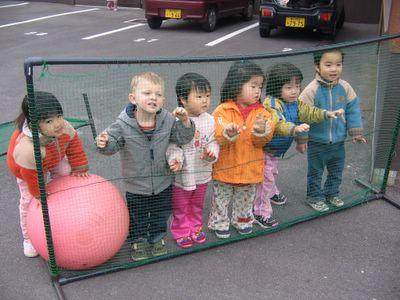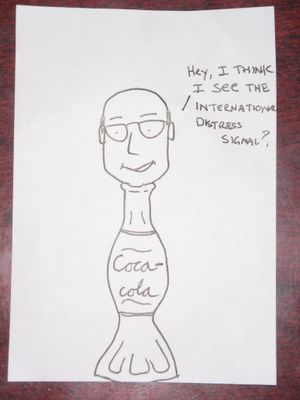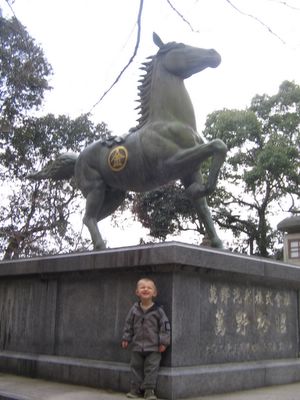March is here, were at the five month mark, and the weather is teasing us with brief glimpses of spring. Though the mornings are still cold and the evenings are still frigid, the sun shines during the day and competes with the winter breeze that comes in off the coast. The other day I ventured to wear a short sleeved shirt to work (okay, so everything else was still went and hanging in the sun room), and all my students were very surprised. Japanese people rarely wear short sleeves in June, let alone March.
Callan is becoming a real baseball player right before our eyes. Last week we took him to the park and he batted while Dad pitched and Mom played catcher. Then Callan pitched for each of us and then batted again. He jumps on grounders, chases after loose balls, and can even throw a pitch in the general vicinity of the bat so mom and I can hit.
At the park today with Mom, Callan was trying very hard to tell some other kids that he wanted to play baseball with them. When words did not work, he carried his bat and ball over to them and handed them a bat. The two girls, who where a few years older than Callan, gladly played a few pitches with him, and Callan told Dad all about it when he got home from work.
Melissa made whole wheat veggie pizza tonight with tomato sauce, broccoli, red peppers and mozzarella cheese. It was great.
Mom and Dad Franklin brought a book about graduate school for Joey when they came and he is currently a hundred pages into it, and is learning more than he ever thought he would about graduate degrees.
I think the most difficult aspect of the entire graduate school world is that you no longer have the luxury of dabbling. As an undergrad I dabbled in history, in communications, in economics, in public relations, in creative writing. Going to graduate school means deciding what I want to focus my studies on. It means dedicating the five years, if not the rest of my life, to this one field. It means I am doing a lot of soul searching. Do I really want to be a writer? Do I want to teach college? Do I want to be an editor (anyone who reads this blog may wonder if that is even a possibility given the gross spelling/grammatical errors)?
More than that, I think the reality that sub-par work just won’t cut it is what scares me the most. Entering an MFA or PhD program in creative writing means that I am attempting to claim a position as an equal among the writers of the world. Maybe not the canonized Thoreaus and Whites, and Dillard’s, but at least the published, the paid, the respected. It means I will be jumping in the ocean without a life jacket, treading water purified and defiled alike by the blood and sweat of genius writers whose crumpled notes at the bottom of their waste bins, spat upon, and toppled by banana peels and cigarette butts, are infinitely more profound, more interesting, (not to mention better spelled) than anything I have written that might be chosen by some drunk editor with a vendetta against the profitability of his own publication. It means that writing isn’t just something I do in the dark of night when the family is asleep, or in a fit of passionate rage after a disagreement with my wife. It means I have an office, dedicated to reading good literature, the best literature, a computer with an ergonomically split keyboard, a book shelf full of anthologies, due dates, an advisor, and the haunting mantra of all academics: Publish or parish!
I am researching graduate schools, reviewing program descriptions, learning the difference between the MA, the MA with creative thesis option, the terminal MFA, the Ph.D. in English, The PhD in English with creative emphasis, and the PhD in Creative Writing. I am discovering that almost every MFA program is “among the oldest in the country,” and also that while some programs focus on “the quality of there faculty rather than the quantity,” other programs tout the benefit of having more than 70 ‘well-published’ faculty.
The programs with slick, easily navigatable web sites are always more inviting. The ones that look like high school web design projects are almost too painful to search through. If I were to choose my school based solely on the website, I would only apply to the University of Iowa. Although that might be a waste of time since they accept about 10 people a year to there program and all of them have already published books. I thought that going to school was where unpublished, or little published folks went to learn what the published folks already know.
Part of the whole selection process for choosing which schools to apply for has been to read the work of potential faculty at the schools I am considering. I haven’t decided if this is counter productive. I recently read an excerpt from “Sick of Nature” by David Gessner, an environmental activist, essayist, instructor from the Wilmington campus of the University of North Carolina. His nature prose, which is at times akin to Bill Bryson or David Sedaris guide is anything but traditional nature writing, and it’s fluid suddenness is knee-shaking. Here’s a quote from his book that I read on his website. (warning: “sh” word coming up in this paragraph)
I am sick of nature. Sick of trees, sick of birds, sick of the ocean. It's been almost four years now, four years of sitting quietly in my study and sipping tea and contemplating the migratory patterns of the semipalmated plover. Four years of writing essays praised as "quiet" by quiet magazines. Four years of having neighborhood children ask their fathers why the man down the street comes to the post office dressed in his pajamas ("Doesn't he work, Daddy?") or having those same fathers wonder why, when the man actually does dress, he dons the eccentric costume of an English bird watcher, complete with binoculars. Four years of being constrained by the gentle straightjacket of genre; that is, four years of writing about the world without being able to say the word "shit." (While talking a lot of scat.) And let's not forget four years of being the official "nature guy" among my circle of friends. Of going on walks and having them pick up every leaf and newt and turd and asking "what's this?" and, when I (defenseless unless armed with my field guides and even then a bumbler) admit I don't know, having to shrug and watch the sinking disappointment in their eyes. “I can’t write like this,” I tell myself after reading the clip. This is like fine china, and I’m a cheap origami cup folded out of old newspaper. No, not even that good. The folded newspaper would have published writing on it. Gessner’s ability to combine bits and pieces of detail about his work, about his interactions with his community, about his own insecurity, without ever riffing too heavily on what he’s trying to get at is writing that I dream about. It’s the kind of writing that makes you say, Hey I could do that, even though you know you never could. I have no idea what a semipalmated plover is, but it sounds as dull as he wants us to think it might be. I doubt the alliteration is an accident either. The revelation of his own inadequacy, which would reveal
me for a fraud, makes the reader love Gessner for his honesty.
And this is the kind of guy I’m supposed to approach and say, “Hey, by the way, I’d like to apply to your program next year, your stuff is really good, and well, do you think you could put in a good word for me next year when the committee gets together over pizza to laugh at a stack of convoluted personal statements, inflated grades, and hopeless wanna-be writing samples?” The sane part of me says, ‘There’s no way you can do this, no way you can scoff at the establishment by presuming you might be able to stand in even the shadow of the same light that these writers stand in.
Some of the websites I have come across have been less than hopeful. The University of Arizona’s creative writing website has a section entitled “Some thoughts on the program.” It is written by the C.E. Poverman, an accomplished fiction writer and Professor at the University.
The ‘thoughts,’ begin like this: “I would like to offer some thoughts on what the U of A Creative Writing Program and its degree can and cannot do for you.” He then proceeds to list several very academic, very practical, expectations about the benefits of an MFA degree, and then the harsh realities of life with an MFA. The few lucky ones get a job if they’ve published two books, while the rest “
turn to secondary interests to support themselves; technical writing for places such as IBM; publicity; and so on. Some, after several years of going along in this way, return sobered to academia and seek more marketable degrees: a PhD in rhetoric and composition; a PhD in literature, and so on. They still want to write, but the exigencies of surviving in what is called a market economy have driven them to make themselves marketable. Some find that it is just wiser to retrain themselves. They go into law, psychology, or whatever else interests--and supports--them.
I imagine being in high school again, and listening to one of those ‘let’s just be friends conversations. The young girl whose overly friendly attitude has convinced another unsuspecting geek that he might have chance with her, now has to sit down and explain reality to her hopeless admirer. But instead of a girl, there is an MFA program and the academic world attached to it. And instead of the geek, there is the aspiring graduate student-writer, who must understand the reality of the program he is considering. I am perfectly aware of the likely-hood of success that lies at the end of this path, and scares me to death. The two biggest reasons to be scared are asleep right now in the next room. I’m not an idealistic, pencil chewing writer with Walden pond fantasies about solitude. I’m a Husband, a Dad, a scout leader, and I want to find a future that allows me to do what I do best to make a living for my family.
My sister said I should be an orthodontist, my dad suggested the military. I mentioned once to Douglas Thayer, a fiction writer and professor at Brigham Young University (who holds an MFA from University of Iowa and has been teaching for 45 years) that I was considering a PhD in English literature and creative writing and he said “What? Do you know how much literature professors make? 45,000 a year! Does your wife know about this?”
Why is everyone trying to scare me, and all the other students out there interested in writing, away from graduate studies in creative writing? Well, it’s because the reality is that most students don’t make it into a tenure track position. In his book “Getting what you came for,” (I forget the Authors name) says that about 20 percent of accepted graduate students in the humanities land decent teaching positions. That leaves the other 80 percent to get computer jobs or go into retail management. Mr. Poverman is right to ask people to consider twice what they hope to get out of an MFA. He is right to scare me, and everyone else who will apply. Creative writing isn’t cut out for everyone, it’s not cut out for most people. In fact it’s not cut out. Dentistry is cut out, even law is cut out. Creative writing is more allusive, so is the academic world. I think the chase is more exciting, more dangerous, more unpredictable.
If I am supposed to figure out what I do best, and learn to do it better, and then find a way to make a living doing it, then shouldn’t I be willing to bet on graduate school’s ability to help me establish a career as a writer, as an editor, as a critical thinker, as a communicator. If only twenty percent of accepted grad students land teaching positions, than my goals is to simply be in that twenty percent. And if I’m not, then I put my talents to use elsewhere, in publishing, in journalism, in editing, in public relations, in scribbling notes on bathroom walls.
So I say thanks to Mr. Poverman for his reality check, for his words of discouragement, and his slightly patronizing tone. He has successfully scared me, and spurred me on. He has brought me to my knees, and kicked me in the rear. It is not enough to think about writing, or to even dabble in it. I must live it. Not in the recluse, typewriter monkey fashion that Mr. Poverman seems so worried about, not because I don’t ‘care about reality,’ not because ‘all I want to do is write,’ not because ‘I can’t be bothered thinking beyond that one necessity,’ not because writings claim is ‘too singular, noble, and imperative to be sullied by other considerations,’ but because it is what I do BEST. It’s the sharpest, most easily drawn arrow in my quiver, and it makes little sense to not seek ways to use it. It would be foolish to go into graduate school planning on not making it. But it would also be foolish to not have a plan B. It would be foolish to go into a career path I will hate, for the sake of money or stability, and it would also be foolish to disregard the exigencies of money and stability for some lofty dream of publishing the next great book. Thank heaven for Mr. Poverman for helping me keep my feet on the ground, and thank heaven for faith, that reminds me there are clouds in which to occasionally place my head.



